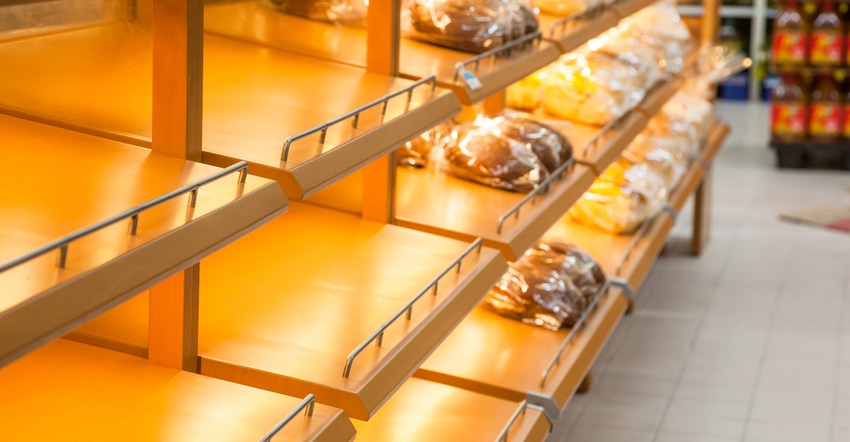March 25, 2020

In the wake of the COVID-19 pandemic, shoppers have seen the temporarily empty shelves at the grocery stores. People are rushing to buy staples — bread, milk, eggs, meats, flour and, of course, toilet paper — in bulk.
But, experts in the agriculture industry say we don't need to worry about food shortages because for many Kansas farmers it's business as usual.
"The farmers, ranchers and agribusinesses of Kansas are an integral part of the economic backbone of the state," according to Mike Beam, Kansas secretary of agriculture. "During this time of uncertainty, Kansas farmers and ranchers are continuing to care for their crops and livestock as they do every day. While we've seen some empty shelves in grocery stores, I want to assure everyone that there is, and will continue to be, safe and adequate food available across Kansas and the United States.”
Chris Tanner is a farmer and the secretary and treasurer of the Kansas Association of Wheat Growers. He says his operation in northwest Kansas hasn't changed much in light of the pandemic.
“Farming can lend itself very naturally to social distancing,” Tanner says. “I'm still gearing up for our busy season, getting my planter ready to go and doing everything I can to ensure that we'll have a safe and consistent food supply in the coming years.”
“There's no worries on food production in the United States."
But life has changed for Tanner. His daughter, who was away at college, is returning home to finish the rest of her semester online before heading to nursing school. His son will also be finishing high school online.
“Like many other families across Kansas, I have a senior in high school this year, and he just lost out on the last third of his senior year and may not have a graduation ceremony. There will not be an FFA banquet. He's going to miss out on his last year of high school golf. There will be no prom. And, he's pretty bummed about it,” Tanner says.
Jason Ochs is secretary and treasurer of the Kansas Wheat Commission. He farms in southwest Kansas and has three kids who will now be home for the rest of the semester. His daughter is also a senior in high school. Ochs looks at this time at home as an opportunity.
"I would love to take this time to teach my kids a whole bunch of things," he says. "We could go do a lot of real life learning skills during this time. That would be pretty powerful."
With all classes switching to online and people social distancing by working at home, the marginal internet in many rural areas is a concern.
"To watch a 10-minute video, it takes me 20 minutes to watch it because it's always buffering," Ochs says. "The teachers are not going to be able to have a live, collaborative learning environment."
Tanner agrees. "I have some neighbors that are in low-lying areas that will not have good enough internet to accommodate their kids' online classes," he says, adding that "a lot of people with younger kids are suddenly looking for daycare providers now."
While these farmers continue growing food and, like so many Kansans, settle into a new normal, they do have some words of wisdom.
"This is a time for people to keep a level head and make smart decisions, and we'll survive this," Ochs says. "Whether you are a restaurant owner or a small family farm or a small business owner, just keep a level head, think long-term, make the right decisions and we're all going to make it. We're a self-sufficient nation."
The downturn in the markets is a huge concern for our nation's food producers.
"As people talk to me, they wonder if they're going to survive this (drop in the markets)," according to Duane Hund, director of the Farm Analyst Program in K-State's Department of Agricultural Economics. Hund’s statement comes from a news release from Kansas State University on March 17.
"My first order of business is to tell them to follow their plan,” he says. “Let's not make knee-jerk, drastic decisions. Let's stick with the plan in place and develop alternative decisions that are made in combination with the facts and what your business advisers will tell you."
Only time will tell what effect this pandemic will ultimately have on the financial and commodity markets, but in the meantime, Kansans can rest assured that their grocery stores will be restocked with all of the necessities thanks to the hard work of Kansas’ farmers and a dedicated food supply chain with flour millers and bakers.
“American farmers are extremely good at what we do," Tanner says. "We're highly productive, and there is no worry about the fact that production of food will continue.
Source: Kansas Wheat, which is solely responsible for the information provided and is wholly owned by the source. Informa Business Media and all its subsidiaries are not responsible for any of the content contained in this information asset.
You May Also Like




